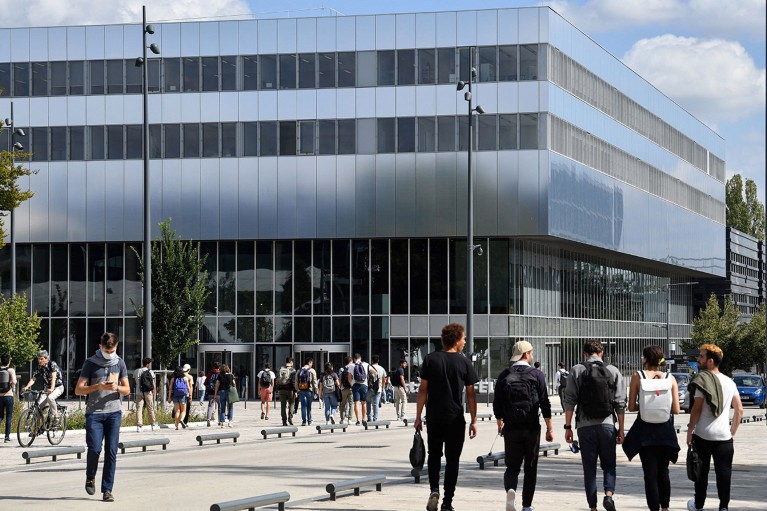
Paris-Saclay University formed from a merger of several institutions.Credit: Alain Jocard/AFP via Getty
The board of directors of Paris-Saclay University, one of Europe’s biggest research campuses, has failed to elect a president after three rounds of voting. The result reflects an ongoing row over the leadership and management structure of Paris-Saclay, which was formed by merging more than a dozen institutions in 2020.
The two candidates had disagreed about how best to solve problems around staff morale and working conditions at the university but, in a vote on 30 April, neither received enough support to be named president. Yves Bernard, an electrical engineer and former director of Polytech Paris-Saclay, one of the institutions that merged to form the university, won more votes than former president Estelle Iacona in all three voting rounds, but failed to score the 19 out of 38 votes needed for an outright victory.
The stalemate means the recruitment process must start afresh. Paris-Saclay’s temporary administrator, Camille Galap, who has been at the helm since Iacona’s term ended in March, has said that a new call for candidates will be published as soon as possible.
“Clearly, the recruitment process will take quite some time,” says Patrick Couvreur, a pharmacologist at Paris-Saclay. “It is not good news for the university, after all the work that has been accomplished to give it an international dimension.” Couvreur supported Iacona for the presidency.
Flawed organization
Saclay accounts for around 13% of French research and brings together 220 labs, nearly 50,000 students, 8,100 researchers and members of academic staff and 8,500 technical and administrative staff members. The mega-campus has arguably achieved its goal of shining on the world stage: it was the first French university to appear on the Academic Ranking of World Universities' top 20 list, in 2020, and has done so every year since, placing 15th in 2023.
Massive shake-up of French science system is biggest in decades
But Paris-Saclay’s complex structure has led to a number of issues for its researchers. Paris-Saclay completely subsumed ten faculties and institutes of the Paris-Sud University, while four of France’s grandes écoles — elite higher-education institutions — along with the Institute of Advanced Scientific Studies (Institut des Hautes Études Scientifiques) and two associate universities were brought under the same banner, but retained control over their budget and recruitment.
The leadership has become increasingly multilayered, says Couvreur, which has increased the number of managers and the administrative burden on staff at all levels. “This is leading to burnout, and is a disincentive to young scientists, who complain they have to undertake work they weren’t hired for.”
In 2021, a study by Paris-based human-resources consultancy Degest concluded that working conditions for staff members had deteriorated since the merger. Despite a massive communications campaign, staff had only a hazy idea of what the Paris-Saclay project was all about, the study said. They also lacked motivation because they felt management did not listen to them, and they questioned the purpose of a number of plans, such as creating links between the various components of the institution, and creating new graduate schools and a bachelor’s-degree institution. Some researchers feared a lack of resources for research, excessive time spent on coordinating operations and bidding for funding, competition between teams for the cash available and heavier administrative workloads.
Competing visions
The two presidential contenders had quite different visions for the future of the university, and views on how to address its problems. Bernard calls for a federated rather than centralized structure, with individual institutions working side by side. The distance of decision-making centres and central services from labs and teaching entities complicates management and procedures, Bernard says.
Iacona’s expired term as president began after she took over the post from education and research minister Sylvie Retailleau, who headed Paris-Saclay until 2022. In her reelection campaign, she said she is against “massive change” and rejects the idea of returning to a federated structure.
“I am in favour of adjusting what we have already in order to build an integrated — not a centralized — structure, where we all decide on policy together, and award the same degrees at each level,” she says.
The university’s board of directors is divided on which is the best approach, and so far shows no signs of rallying behind a single candidate. It is possible that a future contest will include new contenders. Iacona is undecided about whether she will continue her reelection bid, but Bernard intends to stand again. “I can’t identify any particular point in my programme that posed a problem,” he says, adding that he needs “to think about that before deciding on any adjustments”.

 How France overcame the odds to build a research mega campus
How France overcame the odds to build a research mega campus
 France’s research minister has a plan to shake up science
France’s research minister has a plan to shake up science
 How France ramped up its capacity to innovate
How France ramped up its capacity to innovate
 Massive shake-up of French science system is biggest in decades
Massive shake-up of French science system is biggest in decades






